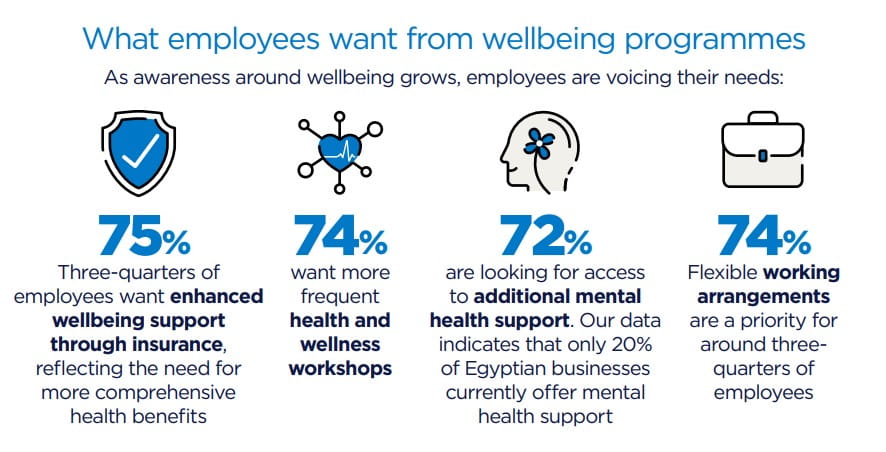Bupa Egypt Insurance survey highlights 92% of employers consider wellbeing a strategic priority, underlining its role in maintaining competitiveness in today's market.

A new survey by Bupa Egypt Insurance evaluates the Return on Wellbeing Investment (ROWI) in Egyptian workplaces, examining how investments in employee health and wellbeing impact productivity, engagement, and business performance. The survey explores the effectiveness of initiatives such as health and wellness workshops, flexible working arrangements, on-site medical check-ups, mental health support, and insurance-covered wellbeing benefits, providing insights into how organisations can maximise the value of their wellbeing strategies.
With 90% of Egyptian companies reporting a positive impact on employee performance and productivity, these initiatives demonstrate a clear link between workplace health investments and business success. As organisations increasingly recognise the return on wellbeing investment, these programmes are becoming a key driver of productivity, engagement, and talent retention, shaping the future of the Egyptian workforce.
90%
of Egyptian companies report a positive impact on employee performance and productivity
The business case for wellbeing: balancing investment with impact
Egyptian businesses are shifting their priorities, as 76% of senior leaders say they are planning to increase spending on workplace wellbeing in the coming year, with 21% expecting to raise their spending by 5-10%. Yet, despite this momentum, financial concerns persist with more than half (54%) of decision-makers stating that budget constraints are the biggest challenge.
76%
of senior leaders intend to increase spending on workplace wellbeing in the coming year
Even though a majority of Egyptian organisations report positive impacts from their wellbeing programmes, many remain cautious about scaling efforts, balancing return on investment with economic pressures. Wellbeing initiatives are already driving measurable business impact, with 53% of senior Egyptian business leaders seeing productivity gains. Additionally, 38% report lower absenteeism and turnover, while the same percentage note higher employee engagement. These results reinforce that workplace wellbeing is not just about employee health—it is a strategic driver of business success.

Egyptian employees prioritise insurance benefits, yet workplace offerings remain limited
While employers acknowledge the importance of wellbeing, many employees feel left behind, with one in three (33%) workers saying their company offers no wellbeing initiatives at all.
Egyptian employees who do have access to wellbeing support are clear on their priorities. Three in four (75%) say improved health coverage, including insurance benefits and screenings, is at the top of their list, while flexible work arrangements and wellness workshops are equally in demand. These findings reflect global workforce trends, where wellbeing programmes are no longer an optional perk but an expected standard.

Embedding wellbeing: a key differentiator in workforce attraction and retention
Egypt’s workforce is making it clear: workplace wellbeing is now a competitive advantage for employers. A large 86% of employees say wellbeing benefits influence their decision when choosing a job, making it a major differentiator in talent acquisition.
Yet, while companies are beginning to invest more, only 44% of employees express satisfaction with their company’s wellbeing offerings, citing policies such as flexible work arrangements, health screenings, and mental health resources as particularly beneficial. 43% report improved work-life balance from implemented workplace wellbeing initiatives, 45% experience better health outcomes, and 40% note increased productivity as direct benefits.
As the focus on employee wellbeing becomes a central part of workplace culture, employees are increasingly seeking organisations that prioritise their health and overall job satisfaction. Companies that offer attractive wellbeing programmes are setting themselves apart in a competitive job market. With 92% of Egyptian business leaders agreeing that workplace wellbeing is a critical business strategy, the question is no longer whether to invest—but how to invest wisely.
